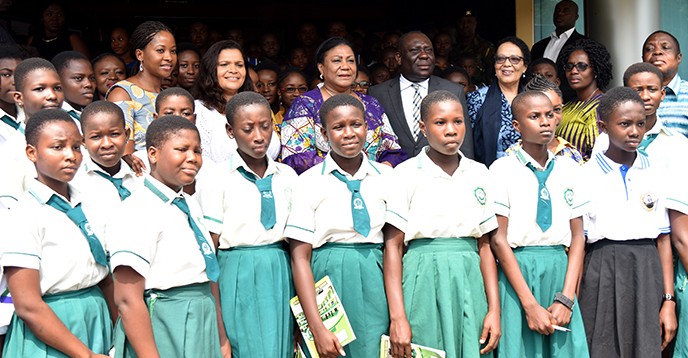news_220118_ghana_1.jpg

of the Girls Can Code UNESCO/IFAP project.
The First Lady of Ghana Ms Rebecca Akufo-Addo launched last week in Accra a UNESCO/IFAP project on empowering women and girls through ICT, under which about 300 junior high school students will be trained in the development of codes and applications.
Entitled “Girls Can Code”, the project aims at training teenagers between the ages of 11 and 14 from ten schools across the ten regions of the country. It has been designed under UNESCO’s Information for All Programme (IFAP) and is intended to bring equity and narrow the gap between men and women in the use of information and communication technologies (ICT).
At the ceremony that took place on 17 January 2018, Ms Akufo-Addo emphasized the role of technology in our rapidly evolving world, stating that it could be used to improve women’s economic outlook while addressing the gender gap. “As more and more women understand the value of ICT in terms of sustainable livelihoods, they will improve their quality of life and become more productive members of the society. Ultimately, we would be helping young girls to become critical thinkers and creators of technologies,” she said.
Commenting the launch of this major initiative, Ms Chafica Haddad, Chair of IFAP, underlined: “We are very proud and grateful of the support landed by Her Excellency Ms Rebecca Akufo-Addo, First Lady of Ghana, to the IFAP Project "Girls Can Code". I hope that this important event will encourage more sponsors from the public institutions and the private sector to further support the project and contribute to its successful implementation and extension. This project is an excellent example of efficient partnership for the empowerment of girls through Information and Communication Technologies in the framework of IFAP’s mandate and priorities.”
According to Ms Melody Boateng, National Programme Officer for Natural Sciences in UNESCO’s Accra Office, young girls selected for the project have a unique opportunity to contribute to the development of the country. She, therefore, urged them to take advantage of this. She commended the First Lady for her support and paid tribute to Ambassador Johanna Odonkor Swankier for her tireless effort in initiating the project.
The Founder and President of Heritage and Cultural Society of Africa (HACSA), Ms Johanna Odonkor Svanikier, the former Ambassador of Ghana to France and former Permanent Delegate of Ghana to UNESCO, under whose tenure the project was initiated, chaired the event.
“Girls Can Code” will be implemented by UNESCO, is collaboration with Advance Information Technology Institute-Kofi Annan Centre of Excellence in ICT (AITI-KACE), Ghana Education Service (GES), Heritage and Cultural Society of Africa (HACSA), DreamOval and Soronko Solution.
The Information for All Programme (IFAP) was established in 2001 to provide a platform for international cooperation in the area of access to information and knowledge for the participation of all in the knowledge societies. IFAP is a unique UNESCO intergovernmental programme that focuses on ensuring that all people have access to information they can use to improve their lives.

